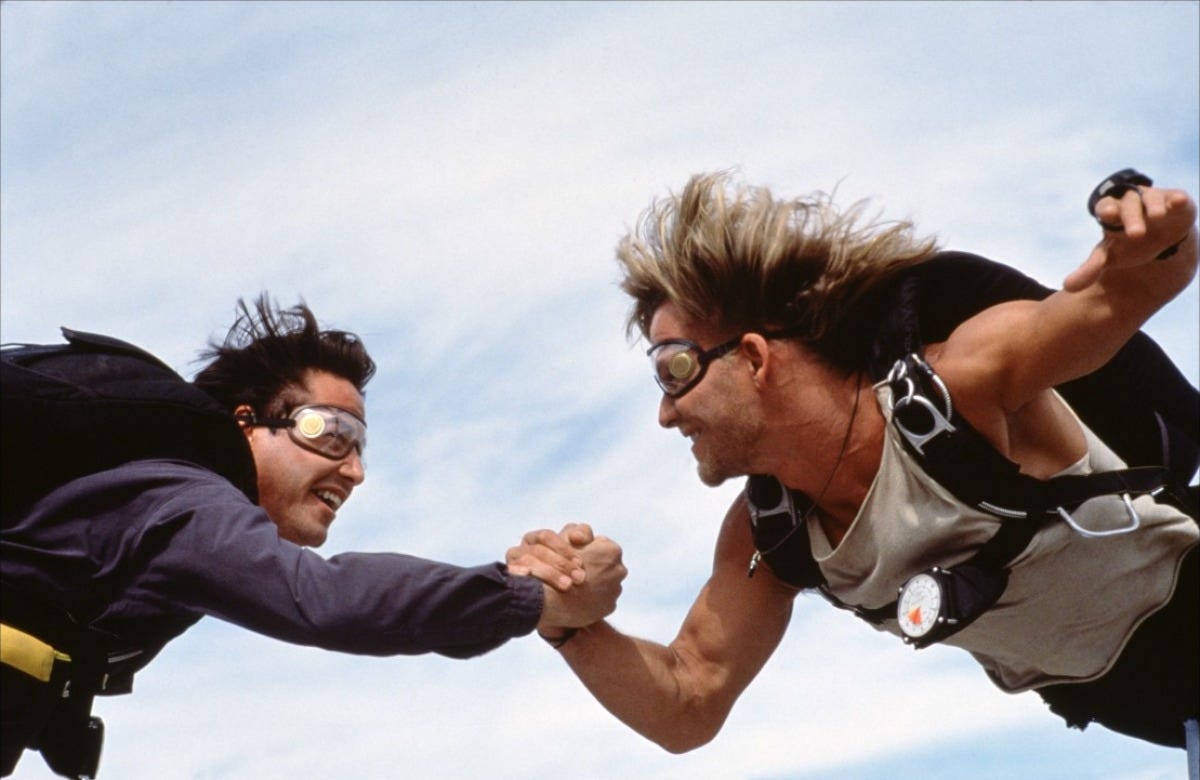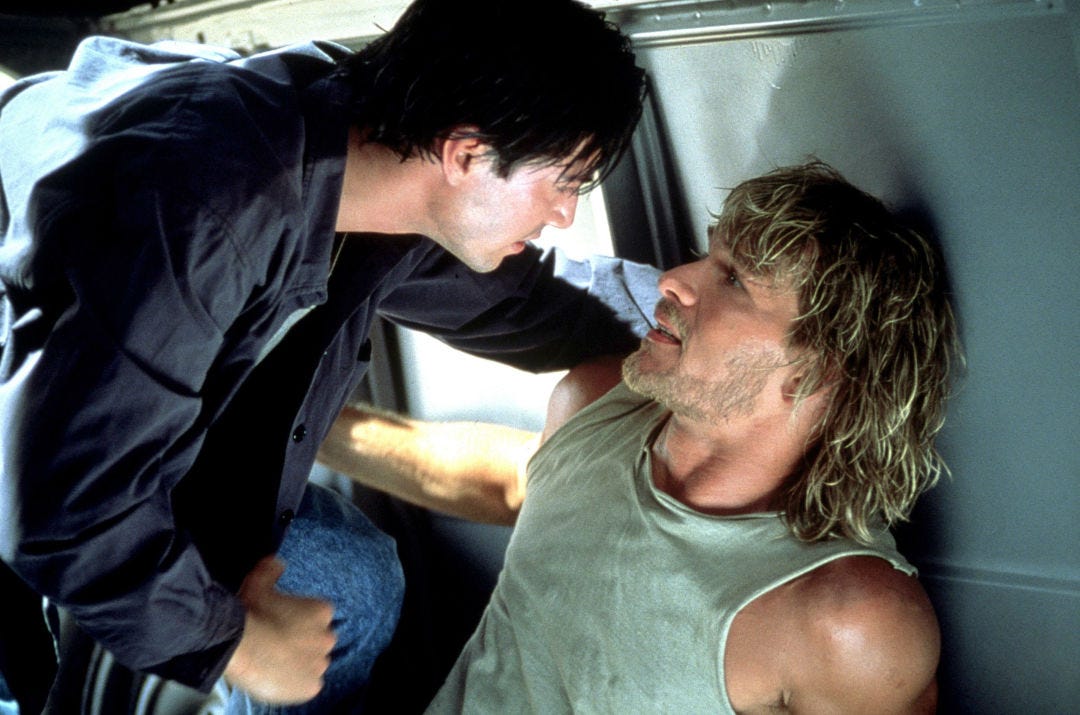Point Break: Liberation From Samsara
What two 90s heart throbs taught us about freeing ourselves from the mortal coil
Oh, hello there, don’t mind me, I was just watching the 1991 masterpiece Point Break for the 30th or so time.
I’d be lying if I said my initial draw, and actually my present draw to this movie, wasn’t that some genius had the audacity to place Patrick Swayze and Keanu Reeves side by side as wild, adrenaline-junkie surfers with a palpable sexual tension that can only be summoned by two people edging death.
AND being the magickal mage that I am I also can’t help but glean deeper meanings from even the most superficial pleasures.
Patrick Swayze plays Bodhi, short for bodhisattva. I mean, it’s right there in the script, I didn’t have to go reaching for that. For anyone unfamiliar, a bodhisattva is one who seeks enlightenment for the purpose of liberating all sentient beings from suffering.
Bodhi, played by Swayze, is a lawless, free-spirited surfer who travels from place to place in accordance with the surf season, in search of the ultimate wave. Johnny Utah (Reeves), by contrast, is an FBI agent and former college football star, whose goal is to catch a gang of bank robbers known as the Ex-Presidents. Utah is introduced to Bodhi when he goes undercover as a surfer, following his FBI partner’s theory that the Ex-Presidents are a surf gang.
Reeve’s character is immediately distrusted and despised by the local beach bums. In one of the earlier scenes, he narrowly avoids getting jumped by four violent, meth head surfers when Bodhi comes to his rescue. As Bodhi and Utah are walking back to Johnny’s car, Bodhi laments how this gang of violent surfers don’t get the spiritual side of surfing.
Bodhi is initially introduced as the Zen master, which many people would associate with a peaceful, love and light type of guru. But let me tell you something that this movie so brilliantly captures, liberation from suffering ain’t pretty. You have to die before you die.
It doesn’t take Johnny long to uncover that the Zen master and his surf clan are the elusive bank robbers. While on a stake out to track the Ex-Presidents’ next heist, Utah ends up in a stand-off with Bodhi, who is disguised in a Reagan mask. This is the first glimpse we see of Johnny wrestling with the internal conflict and desire for liberation that Bodhi stirs in him. While pursuing Bodhi on foot, Johnny jumps off a concrete wall trying to catch his new frenemy, but he collapses in pain upon reinjuring an old football injury to his knee from the impact of landing on the ground. Bodhi hears Utah screaming in pain and turns around and makes direct eye contact with him through the mask. The viewer knows it’s him in the mask from the deep soulful look in his eyes. Johnny has a clear shot in the moment to take down Bodhi, but instead rolls onto his back and fires his gun into the air repeatedly while yelling in agony and frustration.
In one of the next scenes, Bodhi gives a speech to his bank-robbing surfer gang about how Utah being an FBI agent only ups the stakes of the game. He goes on to say the bank robberies were never about the money, but them against the system. A system that kills the human spirit.
I can’t tell you how I know this, but I have it on good authority that approaching the challenges of life as a game is one of the most brilliant lefthand paths to liberation from suffering.
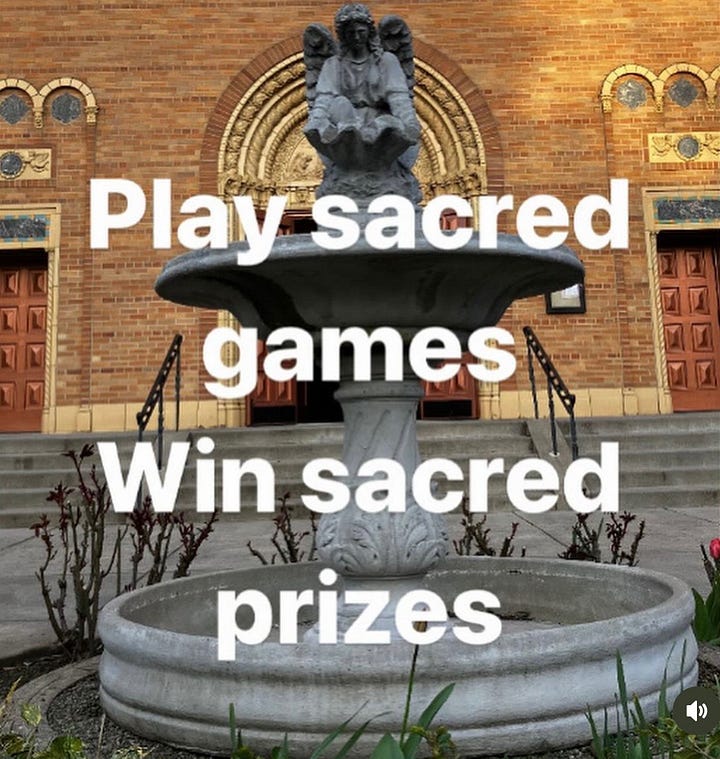
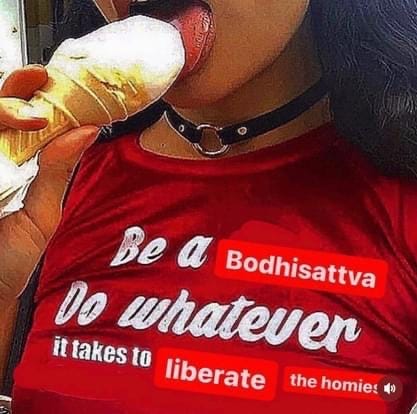
The next morning before sunrise, Bodhi knocks on Utah’s door to take him skydiving, along with the rest of the Ex-Presidents. No one acknowledges that Utah knows who they really are, and they all jump out of a plane, still under the guise of being friends. Free-falling is a moment of pure exhilaration, free of earthly burdens. Furthermore, it’s a gift of the feeling of liberation from Bodhi to Johnny.
Whether he’s doing it consciously or not, Bodhi is trying to wake up Johnny to enlightenment.
Remember when I said liberation from suffering wasn’t pretty? Once Johnny and the Ex-Presidents land safely on the ground, Bodhi tells him there’s something he needs to see. They step into Bodhi’s van where he cues up a video recording of Johnny’s love interest, Tyler (Lori Petty), bound and gagged, followed by one of Bodhi’s less enlightened surfer bros panning the camera from Tyler to a mirror where we see him hold a knife up to Tyler’s throat. As Bodhi cues up the video, he looks at Johnny and tells him that it will sting a bit, but it’s for his own growth. Afterwards, Bodhi cuts the video off and addresses Johnny for the first time as, “Special Agent Utah”.
Johnny reacts the way anyone would in that instance, by threatening Bodhi and pleading for him to release Tyler. Unfortunately for Special Agent Utah, Tyler’s kidnapping serves as an insurance policy that Bodhi gets where he needs to go alive. He tells Johnny that if he doesn’t arrive at his location by a certain time, his lackey will gut Tyler like a pig. Bodhi explains to Utah that this means they have the same goal, to get him where he needs to go. At that moment you can almost see something switch in Johnny’s brain. He goes from threatening and indignant to a kind of muted excitement for the adventure, like he’s decided to play the game. He turns to Bodhi and flatly states, “We’re wasting time”, which elicits laughter from Bodhi and breaks the tension of the scene.
Being at the mercy of Bodhi, Utah is forced to join the Ex-Presidents in their last bank robbery. Johnny yells at Bodhi in protest, “I am an F-B-I agent!” to which Bodhi simply laughs and says, “I know man, innit wild? But you know, that’s what makes it great Johnny. We can exist on a different plane, we can make our own rules. Why be a servant to the law, when you can be its master?” Bodhi understands how to play the game. He understands the fractal nature of reality. Meanwhile, we see Utah fighting it to cling onto the illusion of safety many of us believe comes from observing rules and order.
Some of my more conservative readers might bristle at my constant reveling in Bodhi bucking the law, but it’s less about him breaking the law and his blatant disregard for Special Agent Utah’s authority, and more about what those things represent. They’re metaphors, so you can relax.
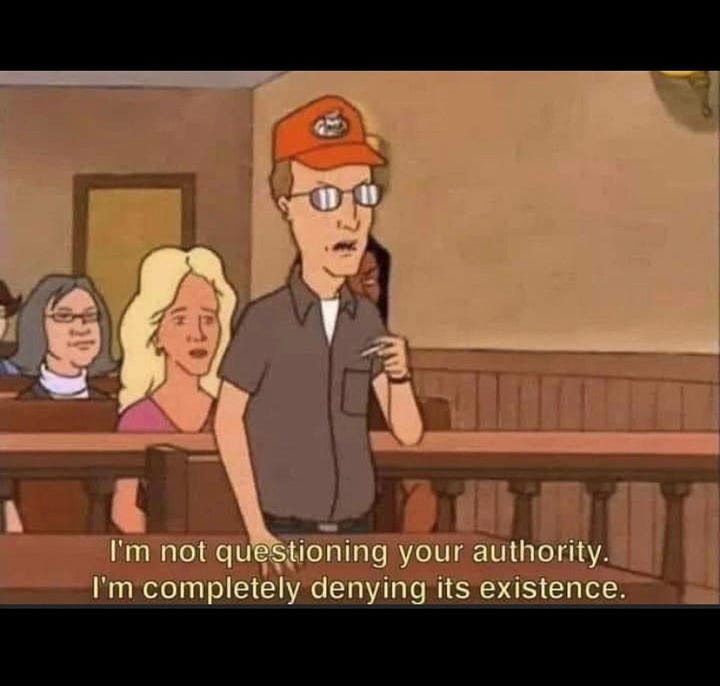
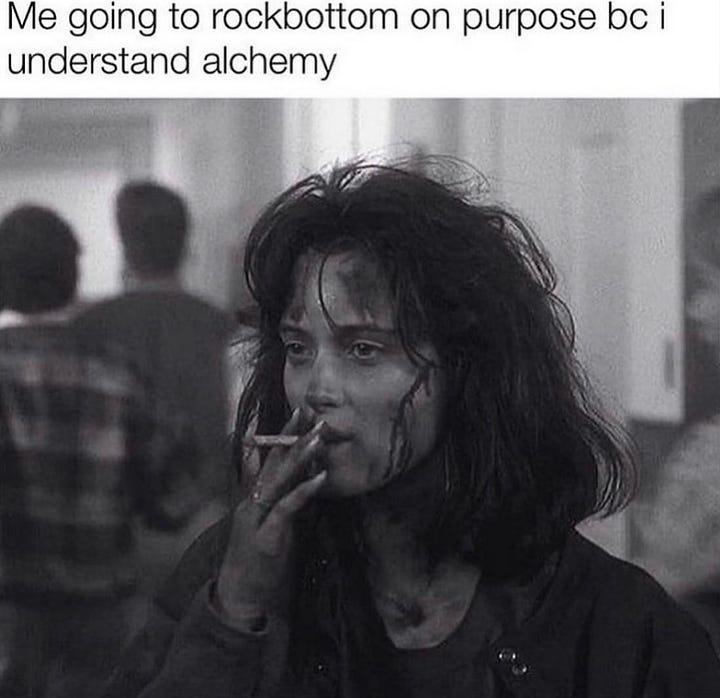
I’m going to let you in on a little secret about bodhisattvas and those that lead us on our quests for spiritual enlightenment, they too must die over and over again. In the Ex-Presidents’ final heist, Bodhi decides to break his own rules (psst psst, you have to continuously break the rules in order to successfully play the game). The Ex-Presidents are notorious for being in and out of banks in 90 seconds or less, always grabbing the cash from the tellers, never going for the vault. Bodhi, as our resident agent of chaos, decides to mix things up by going for the vault, resulting in disaster and bloodshed. Two of the Ex-Presidents get shot in a stand off with an off-duty cop, one of them dies on the scene. In a fit of passionate rage, Bodhi shoots the cop in the chest, killing him almost instantly. Bodhi has to lose two of his brothers as one of his final spiritual death on his own journey. On his way out of the bank Bodhi knocks Utah to the ground before escaping with his remaining posse.
Utah and his FBI partner follow Bodhi and his crew to the Santa Monica airport where they’re planning their final escape. After another shootout at the airport, Johnny’s partner dies along with Bodhi’s remaining surf gang. Both grief-stricken, Bodhi forces Johnny onto the plane, saying, “We are going to ride this all the way Johnny, you and me, so let’s go”. Once in the air, Bodhi informs Johnny there’s not a parachute for him. He tosses his gun aside in the plane and jumps out. Utah grabs Bodhi’s gun and jumps out after him with no parachute. He freefalls til he catches up with Bodhi in midair and latches onto him. Gripped in a downward spiral, reminiscent of bald eagle mating rituals, they fight over who’s going to pull the ripcord. If Johnny pulls the ripcord, it means he has to drop the gun. If Bodhi pulls the ripcord, it’s more a display of weakness in his mind. He tells Johnny the only way it’s going to happen is if he pulls it, so Johnny drops the gun at the last minute and pulls the ripcord.
Once on the ground, Bodhi is able to get to his checkpoint safely, as Johnny is once again at the mercy of the old football injury to his knee. Bodhi tells his thug to let Tyler go, and the scene ends with her and Utah falling into a passionate embrace.
Many months later, as is evident by Johnny Utah’s now grown out surfer hair, we see Johnny finally track down Bodhi in Australia for the 50-year storm. Bodhi stands solemnly on the beach in the pouring rain, wrapped in a poncho, staring out at the ocean in quiet preparation for his final ride. As he stares meditatively at the sea, Johnny walks up behind him and tosses the President Reagan mask at his feet. Bodhi seems more or less unphased by Special Agent Utah’s arrival.
Bodhi asks Johnny if he’s still surfing, to which Johnny replies, “Every day.” Johnny then tells Bodhi he has to take him in, to which Bodhi laughs and says, “Sorry, my friend”. This leads to their final stand-off. God bless the director for giving us one last heated tussle in the pouring rain. Bodhi plays like he’s going to drown Johnny in the ocean, symbolic of a baptism or cleansing of sorts. Bodhi releases Johnny at the last minute, only to discover Johnny has handcuffed himself to Bodhi while underwater. Bodhi looks around to discover he’s surrounded by feds. In a moment of brotherly love, and dare I say friendship, Bodhi convinces Johnny to let him go out into the ocean for one last ride. Seeing the size of the waves, Johnny knows Bodhi isn’t coming back. He chooses to let Bodhi complete his final journey as an act of mercy, but also out of respect and honor for what they’ve been through together. Johnny’s last words to Bodhi are “Vaya con Dios”.
In the exact moment that we see Bodhi being swallowed up in his final ride, the camera cuts to Utah throwing his FBI badge into the ocean. The implication is that he was liberated by Bodhi’s ascension as an enlightened being. As far as I’m concerned, Bodhi completed his bodhisattva vow.
It actually wasn’t my intention to write a lengthy essay about this movie, I had maybe one paragraph about it in my head, but then my need to flesh out my thesis became all-consuming.
My musings on this movie aren’t actually that different from any other thought that flows from my mind late at night. The reason I chose to write about it is because I felt like the director missed an amazing opportunity to make a sequel that sees Utah living wild and free. I imagine his journey would involve less crime and bloodshed than Bodhi’s, but would still take us on an epic quest to find freedom from the confines of our experience with mortality. Maybe I’m just saying this because I wanted to see Keanu Reeves revive his role as a dreamy, wavy-haired surfer, but regardless of my helplessly human desires, I think we can agree that Johnny’s journey was just beginning.






